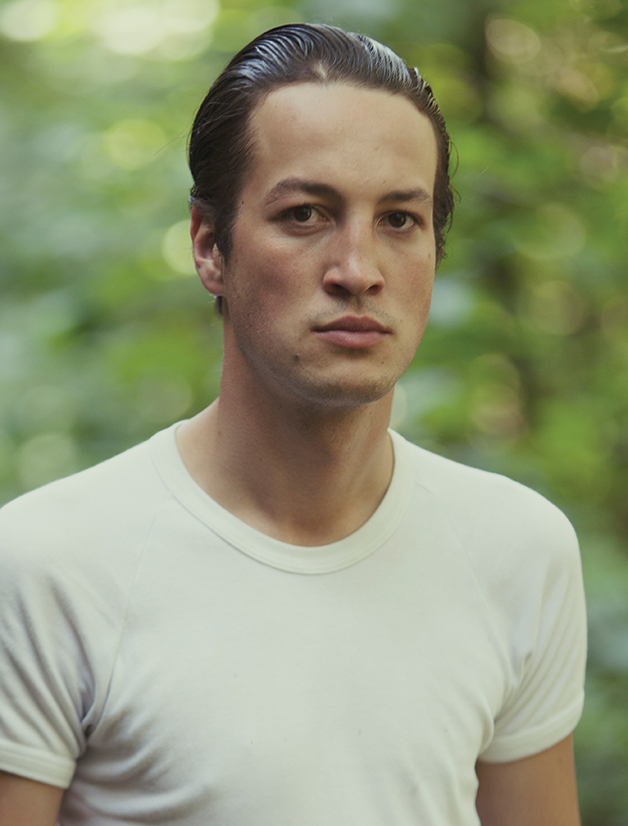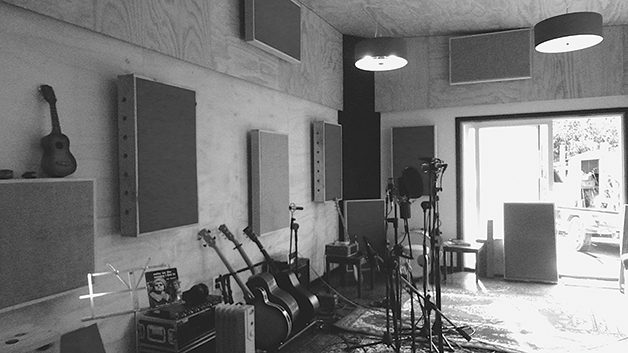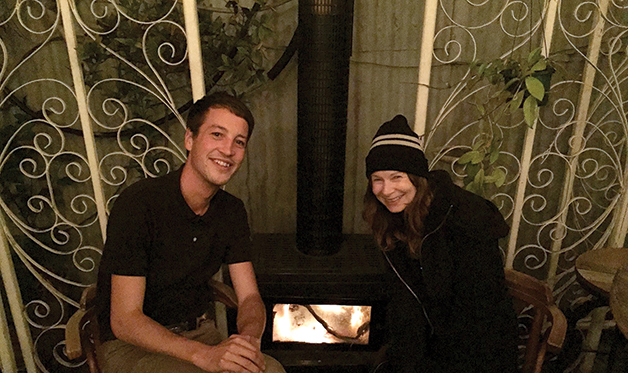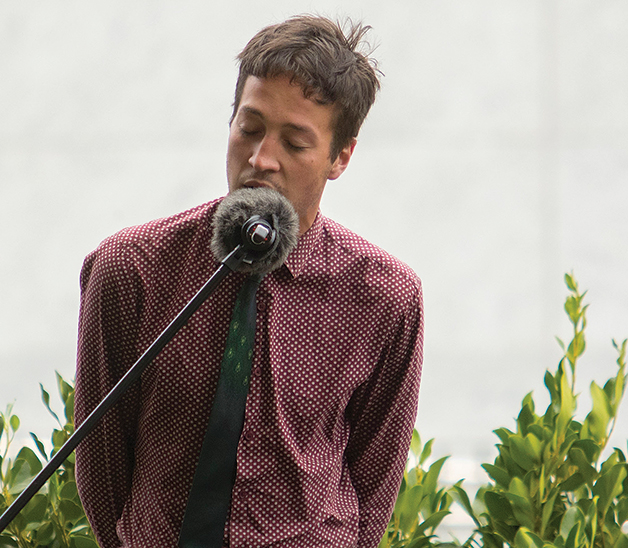Marlon
Jul 3, 2017

At the tender age of 26, multiple award winning Ngāi Tahu musician Marlon Williams is fast becoming a household name both locally and internationally for his hauntingly beautiful folk/country/alternative ballads.
Kaituhi Matt Scobie recently caught up with him in his home town of Lyttelton.

We met up outside the Lyttelton Coffee Company on a sunny Friday at high noon. A familiar space for us both, but far more so for my coffee date Marlon Williams. It takes him three stops to catch up with locals just to get to the counter. I have always found Lyttelton to be a place of warmth and welcome, because of the people who call it home – people like Marlon Williams.
From the marae to the church to the stadium, Marlon Williams is a pretty big deal these days, although he’s too humble to accept that. He is Ngāi Tahu with whakapapa connections to Kāti Huirapa ki Puketeraki, Moeraki and Ngāti Waewae through his mum, Jenny Rendall. Born at home on Cashel Street in Ōtautahi, and educated at Christchurch Boys’ High School and University of Canterbury, Canterbury “is always the anchor.” So why is this Marlon’s place to be?
“I reckon it is probably the landscape. And even just the climate. Coming off a plane in Christchurch and having that crisp Christchurch air completely reinvigorates me.”
This is all in the context of Marlon having spent most of 2016 touring the world playing music. But there’s one more thing. “It’s just easier to communicate with people, face-to-face, when you’re from the same place. It’s a comfort thing, it just feels easier.”
In the last 10 years Marlon has toured New Zealand scores of times with different acts, as well as Australia, the US, the UK, and Europe. He’s signed international record deals, released and collaborated on critically acclaimed albums, and has been nominated for and won several New Zealand music and songwriting awards. These include Best Country Song, Best Male Solo Artist, and Breakthrough Artist of the Year at the New Zealand Music Awards. He’s been on Later… with Jools Holland, Conan with Conan O’Brien, opened for “The Boss” Bruce Springsteen, and acted in television and film.

Ben Edwards’ Lyttelton Records recording studio. The ukulele on the left belonged to Marlon’s pōua Harry Rendall.
But you can read all that stuff on Wikipedia. I’ve got the man himself across the table so there are other things to discuss. First of all, what’s next?
“Well I recorded an album in March just north of San Fran in a house just up the coast.” The album is being produced with Noah Georgeson. “He’s produced all of Devendra Banhart’s albums and a couple of other artists. Have you heard of Cate Le Bon? She’s a Welsh singer and has just put out my two favourite albums of the last few years. So yeah, I’m really excited. I had ten days which isn’t long. But also two weeks of pre-production with Ben.” That’s Ben Edwards, also Ngāi Tahu, of the Sitting Room studio, based in Lyttelton.
“The waiata are more personal and definitely more first-hand so far.”
I’m always interested in people’s exposure to Ngāi Tahutanga and tikanga growing up, because we’ve all had different journeys. So we talk about this for a while. How has growing up affected who Marlon is now, and how he writes and sings?
“I think it’s a combination of sort of… Mum saying things to me when we were on car rides and I did a little bit of Māori history at university so it came from somewhere in there.”
“You can learn everything about the craft of writing through telling stories, and from there you can do anything, y’know? Now I want to write more about myself and I learnt how to do that, how to write, by telling stories – a foundation of telling stories. The old tradition is such a strong part of what we have. So developing the ability to tell stories, I feel, is the crux; and then … people will learn the rest.”
Marlon sang in such beautiful te reo Māori at the opening of the Canterbury Earthquake National Memorial, so I ask whether there was a lot of waiata in the house growing up.
“Basically just going to Hui-ā-Tau every year and Mum was really insistent that we knew the waiata, like, ‘We have to know the waiata! We can’t be embarrassed! We’ve gotta sing real loud!’ Normally it’d be like our holiday for the year.”
A recent song of Marlon’s doing the rounds on the internet is Arahura. It’s a title we’ll all be familiar with. It seems to me to be a definite push from Marlon in asserting Ngāi Tahutanga into his music and lyrics. I wonder whether this is a second album thing, a career thing, or an age thing.
“I think it’s probably all of those things, but definitely an age thing. I remember talking to my Mum about it and she said 26 was a year when things turned over again for her. It’s like… you’ve gotten over the initial storm of the teens well and truly, but it requires a spring cleaning again I guess.

Marlon with his mum Jenny Rendall.
“I’m trying to find some centre to the way in which my writing is changing. But it’s really hard to do, to try and locate what’s changing and why. I think I’m now trying to write more emotively and more first-hand, which is something I sort of avoided on my first album.
“It is a terrifying thing when you’ve got to interrogate yourself a little bit.”
Especially when this is done through music and released into the public realm?
“Yeah! Then they interrogate it and put themselves on it. So there’s always that to hide behind too.”
But this critical “coming of age” self-reflection is done through song and stories. So we share stories about story-telling.
“I actually wrote it (Arahura) for (friend) Kate O’Brien’s Dad’s 60th, because he’s just such a West Coast man. His name is Peter which means “the rock”. And I thought it’s a weird truism of life so far that all the Peters I know in this world are rocks. Every one of them is a really solid person. And then I just thought, ‘I want to write him a song about the West Coast.’
The Arahura, it ebbs and it flows
It changes in ways only rivers can know
And when I look down from the mountain above
I know I am bound to the river I love
But when I was young, I studied those ways
Now I kept them with me, through all of my days
Te Rauparaha had the greenest of eyes
He came a long way for a shimmering prize
And God only knows what he needed stones for
But you didn’t mind, for you’ve a million more
And in a million years I’ll be a rock on that hill
But in a million more I don’t know that I will.
“The idea is about the uncaring landscape – and how it’s not changeless, it changes over long periods of time – but it’s slow enough that it doesn’t really care what man is up to.”
Whatungarongaro te tangata toitū te whenua – As man disappears from sight, the land remains.
So in Arahura, is Marlon telling a Ngāi Tahu story through waiata? “In one sense, yeah, one story arc is just an oral telling of something that happened in the tradition of song.
“There’s The Ballad of Minnie Dean, a song that’s using what I would call newspaper writing… there’s something really tragically cold about a certain kind of writing which is just descriptive about the detailing of events. Just holding a mirror up. I found that really interesting, it’s like a key element of old bluegrass music.”
But is this different to the way that hearing and telling Ngāi Tahu stories can shape us?
“That’s a good point actually. I’ve never really thought about that. I guess like… it sort of reflects certain fairy tales that my parents used to read me. Those sort of weird, like, Grimm’s Fairy Tales. All of these things happen and you’re left to work out and glean what you want from it.”
“I feel like the more tribal members have a sound knowledge of te reo, the better. Because I really think the language is the way forward. Without the language, so much of what we are able to access is closed up.”
At this point I decide that because I’m writing for TE KARAKA, I should ask a favourite TE KARAKA question: “What are your aspirations for Ngāi Tahu?”
“Man I find this question so hard! I reckon utilise what’s already deeply embedded in the culture. Like for me it was going to Hui-ā-Tau and learning all these waiata y’know? And the, sort of, lovely pressure that comes with it. It’s a healthy pressure.”

Marlon performing at the Christchurch Earthquake Memorial event, 22nd February 2017.
And an important follow-up to a question on aspirations for Ngāi Tahu, a very large group of very diverse people, would be advice on how to get there. Especially advice for aspiring artistic rakatahi. According to Marlon, who is reluctant to give anyone else advice, it’s about reo, kōrero, and tikanga.
“I feel like the more tribal members have a sound knowledge of te reo, the better. Because I really think the language is the way forward. Without the language, so much of what we are able to access is closed up. It’s an aspiration for me too!
“I had plans last year just to do an album of lullabies in te reo with two Samoan sisters, the Bull sisters (Vika and Linda) from Australia actually – but we haven’t done it yet. I really want to. Three-part harmonies and guitars. Some Ngāi Tahu tunes, like Tahu Pōtiki, mainly the songs that the Crofts sisters wrote. Those are my favourites, so it’ll be predominantly that. That’s another reason I want to learn te reo again, and much better, so that I can write in it.
“You can learn everything about the craft of writing through telling stories, and from there you can do anything, y’know? Now I want to write more about myself and I learnt how to do that, how to write, by telling stories – a foundation of telling stories. The old tradition is such a strong part of what we have. So developing the ability to tell stories, I feel, is the crux; and then, things will sort of just… people will learn the rest.
“Tikanga is important but also what’s more important is allowing people to break from tikanga too. Because of course with tikanga you should know the rules that you’re breaking. But there’s a certain preciousness that comes with it, y’know? I always think about Sir Āpirana Ngata proclaiming that we should paint all the Marae in that red-brown colour! You simplify to survive and I feel like while that’s true, it’s sort of a subsistence. Strength really comes from the change and there’s nothing inherently wrong with the change, but it’s so hard to do it when you’re marginalised.”
So you have to fight to adapt to circumstances but fight to change those circumstances too?
“Yeah, and not be afraid of it!”
Marlon will be performing at the Ngāi Tahu Hui-ā-Iwi in Ōtautahi 24 – 26 November 2017.